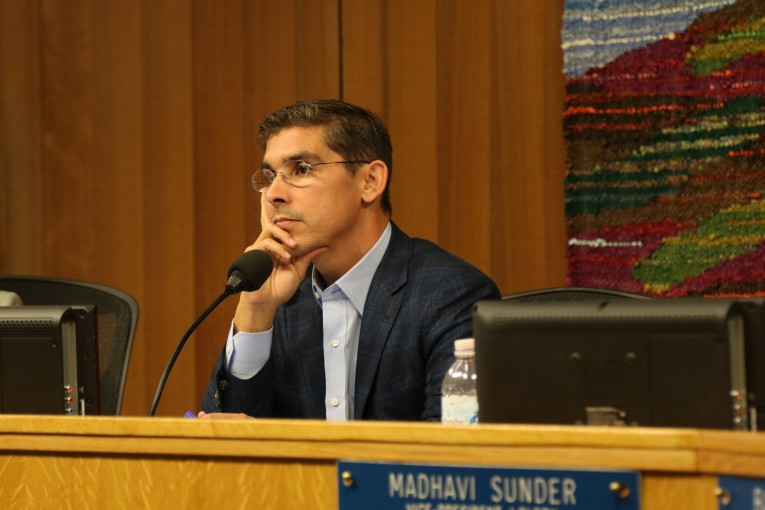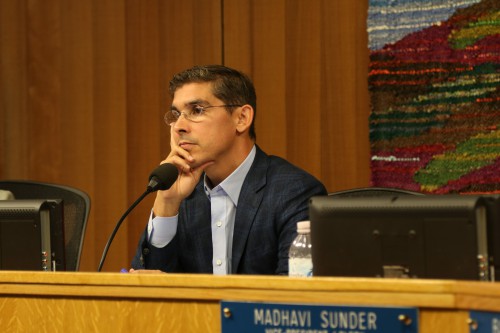

The Vanguard will be publishing the comments of each of the five school board members on the AIM program. We began with the comments of Susan Lovenburg on Sunday and Barbara Archer on Monday, Madhavi Sunder on Tuesday, and Tom Adams on Wednesday. Today we conclude with what Board President Alan Fernandes said. Below is a video clip from his comments.
Alan Fernandes:
I know to a person on the board, that we all care very deeply about making sure our district is serving all of our children to the best of our abilities. I just kind of wanted to say that because we live in sometimes a divisive world and we immediately look to see, I disagree with you there or I take issue with you there.
It’s always just interesting to me this issue as its talked about in the community – it starts from where we’re different and occasionally sometimes we get to where we agree – I just hope that you all realize that in the end, we all up here and I know you all out there care very deeply about the children in our district which is why you’re here this morning.
I first do want to echo the appreciation to the administration for coming up with the proposal – I know you guys put a lot of hard work in it – after all, it’s your job, but good job.
It was a very robust debate and discussion and I want to thank literally everyone who has come in our previous meetings to share their thoughts on the program, asked their questions about where we’re going, what we’re doing because I wish I really had the foresight to really know how I am feeling about this issue and how it’s evolved in my mind.
Really, you all out there have helped shape my thinking on this throughout – it’s evolving as I think it should. Not only for me, but probably is the case for my colleagues. But you all deserve a lot of credit for your engagement and I know we all up here appreciate it.
I do want to say that you know I hear some talk (that) your board’s not getting along, it must be tough up there. I kind of laugh at that because I think sometimes people read the paper or the Vanguard and they assume that there’s some agenda or strife or differences of opinion up here and I got to tell you this is a great board and it’s a true honor for me to serve with my colleagues up here because I do believe at the end of the day, we all care about one thing and that’s making this district the best it possibly could be.
I love the spirited debate and I know we’ll have more in the future on it – so really I would close down that.
I want to spend a couple of seconds here about my actual input on this because we mostly talked about our vision and our ideals, but I haven’t heard a lot of… hey on this page, line blah blah blah, says this or that, and I think this.
So I would say is yeah I was trying to explain this the other day to someone who doesn’t even live in this state about the upcoming school board meeting. And what are you talking about? Well we’re talking about our AIM program, you might know it as GATE. (His friend said) what’s your current GATE program like?
We have to currently identify children, we do that. We administer a test. If the score’s 96, that determines whether or not you’re in. We use a particular test.
(His friend said) well what’s the proposal?
We’re talking about going to 98.
Are you changing the tests?
No, the proposal is the same tests.
So I guess my point is – I get it, there’s change that may result ultimately from our actions, but it’s not earth shattering totally 180 degrees. We’re still going to do what we do here. What we do here is really serve not only the most unique and gifted and talented and high achieving students, but we endeavor to serve everyone. That’s what really the gist of this is all about.
Having said that – like I said before – when the state moves in a direction, sometimes they phase things in and the purpose of doing that is to collect data. We always pick and pull from what we want. Sometimes people will say – that’s not data driven, I need to see the stats, the statistics and the reports on that. But on the flipside, on another issue – you didn’t get parent involvement on that. You didn’t get a survey of the child to see if they liked it – yeah I see your numbers there but did we really…
The point is that we’re trying to do everything you possibly can with measures, with mechanisms to identify children for the types of program that we have. I asked, earlier in the year when we had Professor (Tobin) White and Professor (Scott) Carrell, is there a test that predicts your likelihood of success for a particular type of program?
Comparison – when you go to law school, you take the LSAT. Why? Because that is a predictor, they say of your success in law school, it doesn’t mean you’re going to be a great lawyer. This test is structured to identify how successful you will be with the law school curriculum. There is no analogous test for the type of program that we have – that’s what the literature says, that’s what our experts have said.
What we’re left with at the end of the day, is trying to come up and use multiple measures which is why multiple measures are the best way to really identify which children should be served at any given point.
Giving my feed – I’m encouraged by the proposal, I prefer a little bit more time than the October 15th, I think something like this to my mind needs to sit a little longer. I want to do my outreach – I think there is more outreach that should be done with teachers… our AIM teachers, but all teachers.
I have a particular preference to wait a little while, I’m very concerned about the impact of third graders, now. I would really want the administration and I’d love to hear from my colleagues about what about a phased-in approach that maybe we go to 97 in this year, and we implement our professional development and we also perfect and get data back on are we doing differentiation, how well we’re doing it, what’s it look like – the success measures that Trustee Lovenburg talked about and then is it appropriate to move it to 98 at that point in the following year.
I don’t think there’s anything wrong making changes certainly but doing so in a thoughtful deliberative way while we’re constantly monitoring the progress we’re making and it should be sort of an ongoing thing because the truth is it’s a community driven thing, it’s a program that there’s no format or template you can take to a district and say you do this and everything will work out perfect for your community.
I’d like to hear where others are in terms of timing and just talk through what they might need to see when it comes back.






So he thinks the new AIM proposal is sound, regardless of the lack of data to justify it. He just thinks the public needs more transition time to get used to the idea…
that seems to be the case. i figured fernandes would attempt to forge a compromise, i’m surprised its there.
Agree.
What I see in the comments by Fernandes and Adams is a slight possibility of a compromise with a 3 – 2 vote outcome.